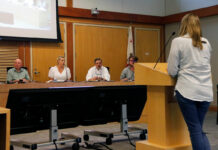It’s summer below the equator. Since I retired as the rector of
St. Paul’s Church, I have spent two or three months a year as a
guest lecturer in an Anglican seminary in Arequipa, Peru. I
recently spent a week at a conference in Lima which is on the
coast, is humid, and is in the 70’s and 80’s this time of year. It
was great to get out of Lima and back to Arequipa, which is about
8,000 feet above sea level, is in the 60’s or 70’s in the day time
and in the 40’s or 50’s at night. Schools are out for summer
vacation and many Arequipenos close their shops or take time off
from work to go down to Mollendo, the nearest beach town. It’s 80
miles away, about a two-hour bus ride. Descending 8,000 feet in 80
miles you can imagine what the road is like.
Half or more of the K-12 students in Arequipa attend independent
or church-related private schools. This includes many students from
low income families whose parents make great sacrifices to pay the
tuition. Sadly, the state schools have a bad reputation, apparently
with good reason. The Anglican Church operates a K-12 school in a
working class neighborhood. My wife Bonnie has been a volunteer
English teacher at the school, Colegio Anglicano San Lucas, St.
Luke’s Anglican School, and we both feel that it provides good
academic preparation as well as sound Christian moral and spiritual
values. The Anglican Church also operates two orphanages in
Arequipa, one for young children and the other for teenagers.
Margot Jahuira, who grew up in the orphanages and who is a graduate
of St. Luke’s School got a first on the entrance exams for the
National University of St. Augustine, one of the most highly
regarded universities in Peru. This is a tribute to the orphanages,
to St. Luke’s School, and, of course, to Margot.
Many of the independent private schools are named after famous
literary, scientific, or academic figures. One of my seminarians is
the director of the Faraday School, named after Michael Faraday,
the 19th century physicist and chemist. There’s a Max Uhl School,
and a Sir Walter Scott School, and a Charles Dickens School. I
haven’t seen it, but someone told me there’s a Bill Gates School. I
asked my seminarian, who’s the director of the Faraday School, what
these names are all about and he says it’s about status, the idea
that parents of potential students will associate the school with
academic excellence in one field or another. He added, with a wry
smile, that in the case of the Bill Gates School maybe they were
hoping to get some money.
Since I was last here last September a new school has opened in
my neighborhood. I walk past it every day on my way from my little
apartment to the church where the seminary classrooms and library
are located. It’s the Benjamin Franklin School. The school is
running a summer session so there are students and staff around as
I walk by. The other day I greeted a staff member who was working
on a mural on the wall around the school. (Many schools
have attractive murals on their walls.) I said hello, and asked
him how the school decided on the name Benjamin Franklin. Oh, he
said, he’s a very famous scientist and mathematician. Well, I said,
I’m from the U.S. and he was also one of our founding fathers and
signed the Declaration of Independence when the colonies revolted
against England to become an independent country, and he also
helped write the U.S. Constitution. Oh, he said, very interesting.
I really wanted to tell him Franklin’s remark about signing the
Declaration of Independence. “We must,” said Franklin, “all hang
together or assuredly we shall all hang separately.” The problem is
that in Spanish the verb one might use for hang together, and the
verb for hang, as in hang by the neck until dead, are different
so Franklin’s playful pun about a matter of life and death is lost.
So I settled for another of Franklin’s well known sayings. “Beer,”
he said, “is proof that God loves us and wants us to be happy.”
This delighted my new friend and I’m sure he’ll share it with other
staff members of the Benjamin Franklin School, if not with the
students.
Canon Marvin Bowers is a retired clergyman and may be
reached at fr************@***il.com.








